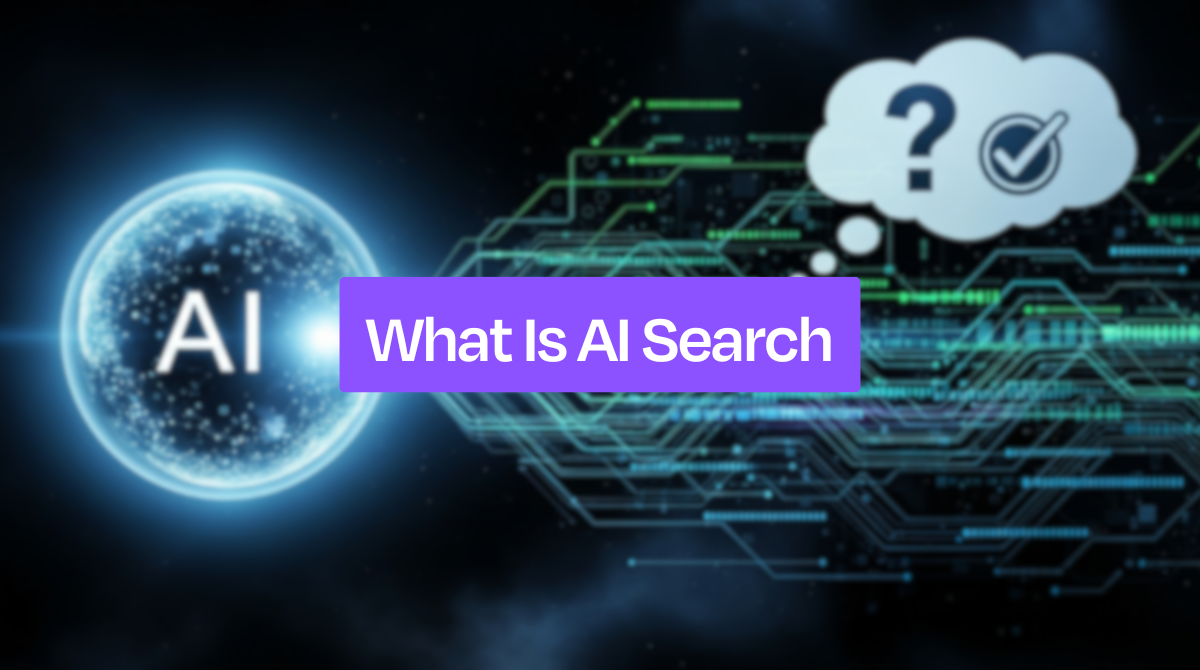You ask Google a simple question, but get a wall of links in return. Now you have to click, scroll, and piece together the answer yourself. It’s a frustrating process that wastes valuable time just to find a straightforward piece of information.
This old way of searching is quickly being replaced. AI search engines are now delivering direct, summarized answers instantly.
This guide breaks down exactly what AI search is. We'll explore what it does, how to use it, compare it to what you're used to, and discuss other relevant factors.
TL;DR:
-
AI search delivers direct, summarized answers instantly instead of requiring users to click through multiple links and piece together information themselves
-
These systems use Large Language Models to understand context, scan web sources, and synthesize information from multiple sites into conversational responses
-
Major benefits include time savings, handling complex layered questions, and creative brainstorming, but risks include AI hallucinations and potential algorithmic bias
-
Google's AI Overviews appears automatically in search results, while users can click "Web" filter to return to traditional link-based results
What is AI Search?
Think about how you've always used a search engine. You type something in, and you get a long list of blue links. It's basically a directory. You still have to do the work of clicking, reading, and figuring out the real answer.
AI search flips that model on its head. Instead of giving you a list of links to read, it gives you the answer directly.
Imagine you're trying to bake a cake. A traditional search engine gives you ten different recipes (the links), and you have to read through them to find the best one.
An AI search engine looks at all those recipes and then writes out a simple, combined set of instructions for you. It does the research and gives you a finished product.
AI search uses powerful artificial intelligence to understand the actual meaning and context of your question, not just the keywords.
It then scours the web for information, synthesizes what it finds from multiple sources, and presents you with a single, summarized answer in a conversational way. It's a shift from a search engine being a simple directory to being an active research assistant.
What Does AI Search Do?
At its most basic level, AI search saves you the time and effort of clicking through countless links. But its real power lies in the variety of tasks it can handle, acting less like a simple search bar and more like an intelligent assistant.
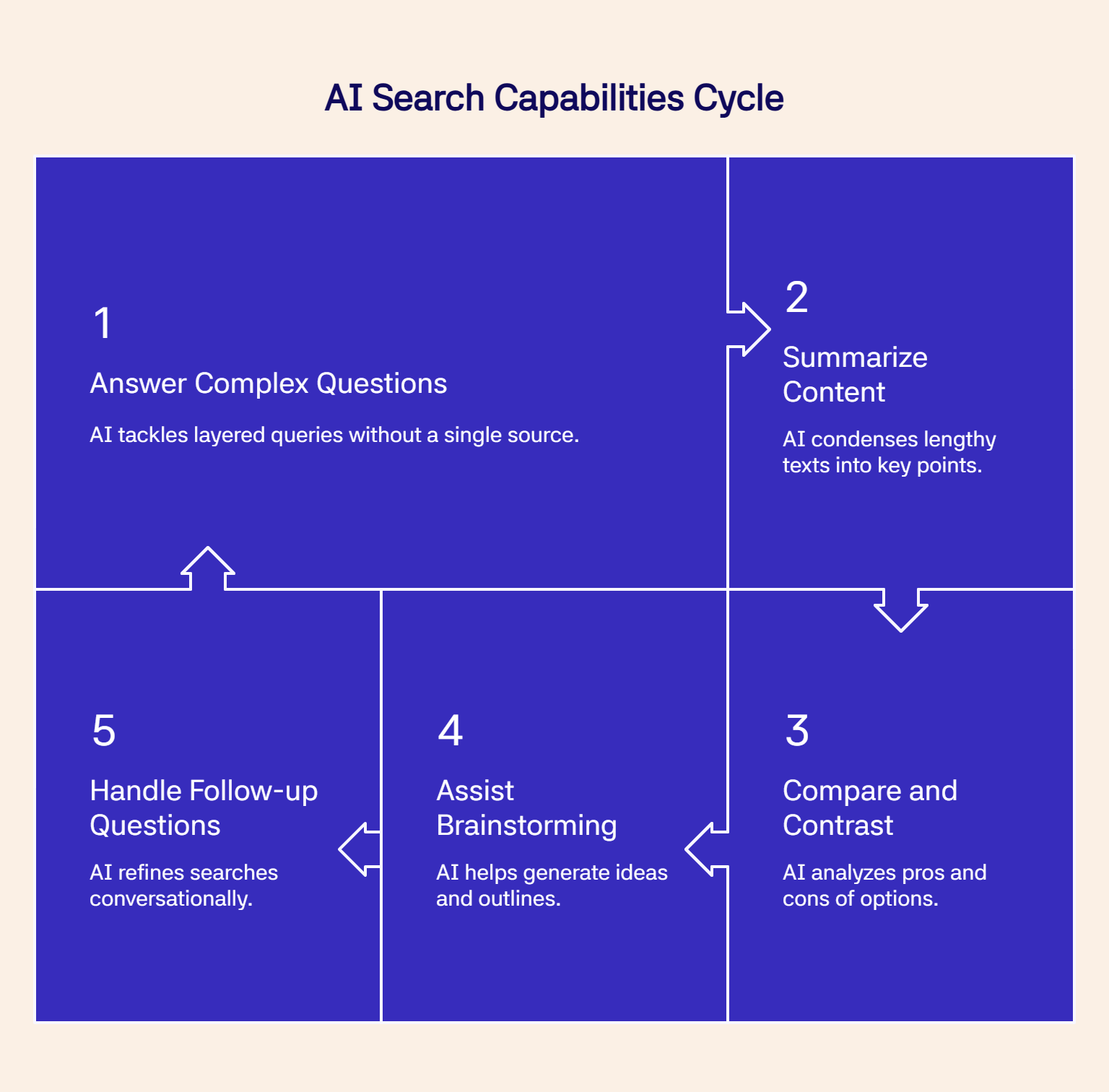
Its capabilities go much further than you might think. It can:
-
Answer complex, layered questions that don't have a single, straightforward source on the web.
-
Summarize long articles, research papers, or even videos into a few key bullet points.
-
Compare and contrast different products, services, or ideas, laying out the pros and cons for you.
-
Help with brainstorming and creativity. It can act as a powerful partner, helping you generate ideas for your next project or outline an entire article. Many creators use this kind of technology to kickstart their content creation process and overcome writer's block.
-
Handle follow-up questions conversationally, allowing you to refine your search and dig deeper into a topic without starting over.
How Does AI Search Actually Work?
The "magic" behind AI search isn't magic at all, but a combination of sophisticated technologies working in harmony. The star of the show is a Large Language Model (LLM), the same kind of technology that powers tools like ChatGPT.
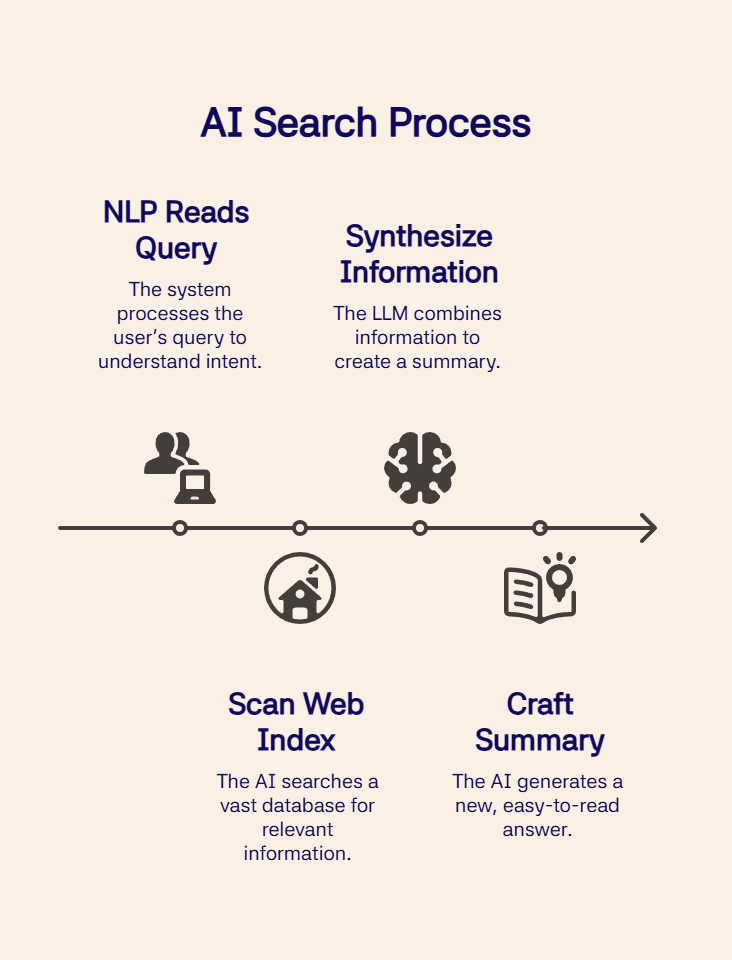
Here's a simple breakdown of the process:
-
Understanding Your Question: First, a system called Natural Language Processing (NLP) reads your query. It helps the machine understand the intent and context behind your words, just as a human would.
-
Finding Information: The AI then scans a massive index of the web to find the most relevant, reliable, and up-to-date sources of information related to your query.
-
Creating the Answer: Finally, the "generative" part of the LLM gets to work. It takes the information gathered from all those different sources and synthesizes it, crafting a completely new, easy-to-read summary that directly answers your question.
What Are Some Examples of AI Search Engines?
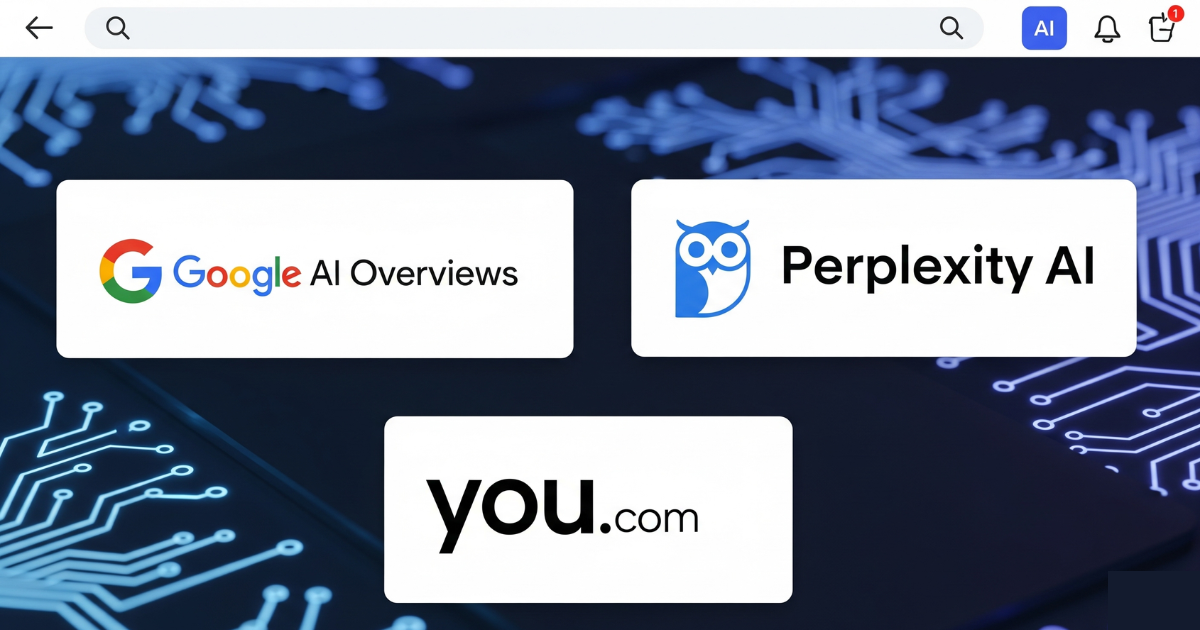
While the technology is still young, you can already see it in action across the web. It's not just one company; several key players are shaping the future of search, each with a slightly different approach.
-
Google's AI Overviews: This is the one most people will encounter. It's not a separate product but is integrated directly into the main Google search page. For many questions, a special box will appear at the top of the results, providing a direct, AI-generated summary.
-
Perplexity AI: Many people call this an "answer engine" rather than a search engine. It's built from the ground up to be a conversational tool. It gives you direct answers and is particularly good at showing its sources with clear citations, which helps you trust the information.
-
You.com: This platform offers a more customizable experience. It blends a traditional search layout with a powerful AI chatbot, allowing you to choose how you want to find your information.
Related Read: AI Search Engines Vs Traditional Search Engines
How Is AI Search Different from a Traditional Google Search?
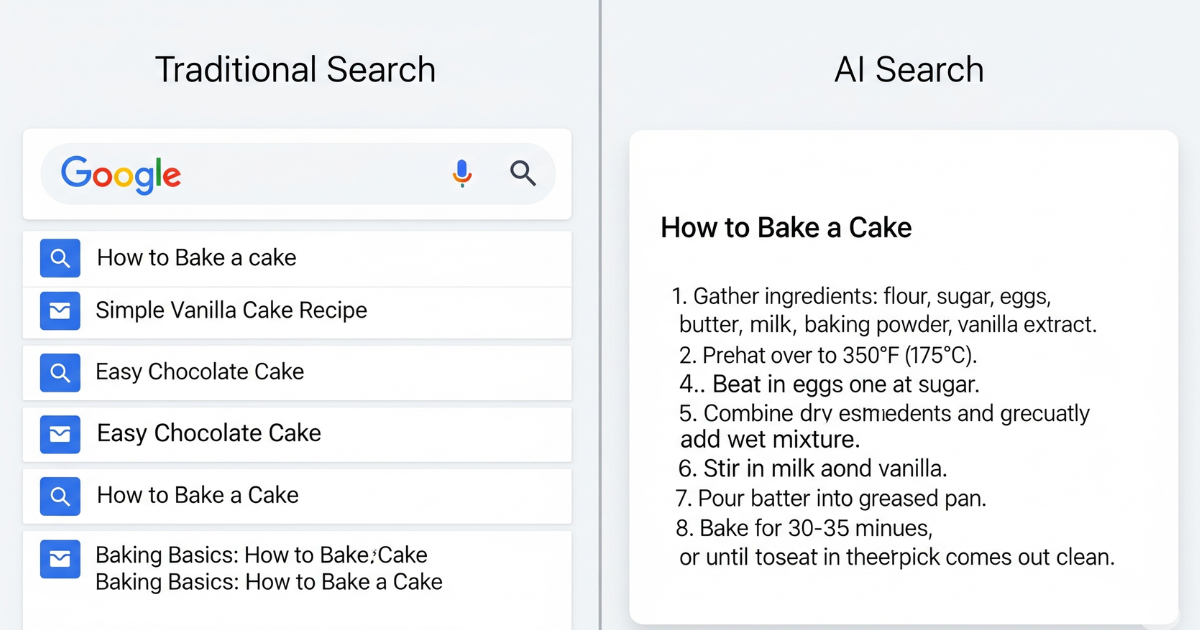
The fundamental difference between AI search and traditional search is how they deliver information. A traditional search acts as a directory, pointing you to potential sources. An AI search works as an answer engine, giving you a finished summary.
Here is a direct comparison of their key features:
| Feature | Traditional Search | AI Search |
|---|---|---|
| Primary Output | A ranked list of links to websites. | A direct, summarized answer in a text block. |
| User's Role | You are the researcher. You must click, read, and synthesize information. | You are a questioner. You verify the answer and ask follow-up questions. |
| Interaction Style | Typically, a one-time query and response. | Conversational, allowing for follow-up questions and refinements. |
| Source of Information | The links themselves are the sources you evaluate. | Sources are often cited within or below the generated summary. |
| Main Goal | To provide you with the best possible resources. | To provide you with the best possible answer. |
Pros and Cons of AI Search
AI search is a genuinely powerful tool, but it's not perfect. Like any major technological shift, it comes with a fantastic set of benefits and some significant drawbacks you need to be aware of. It's a classic double-edged sword.
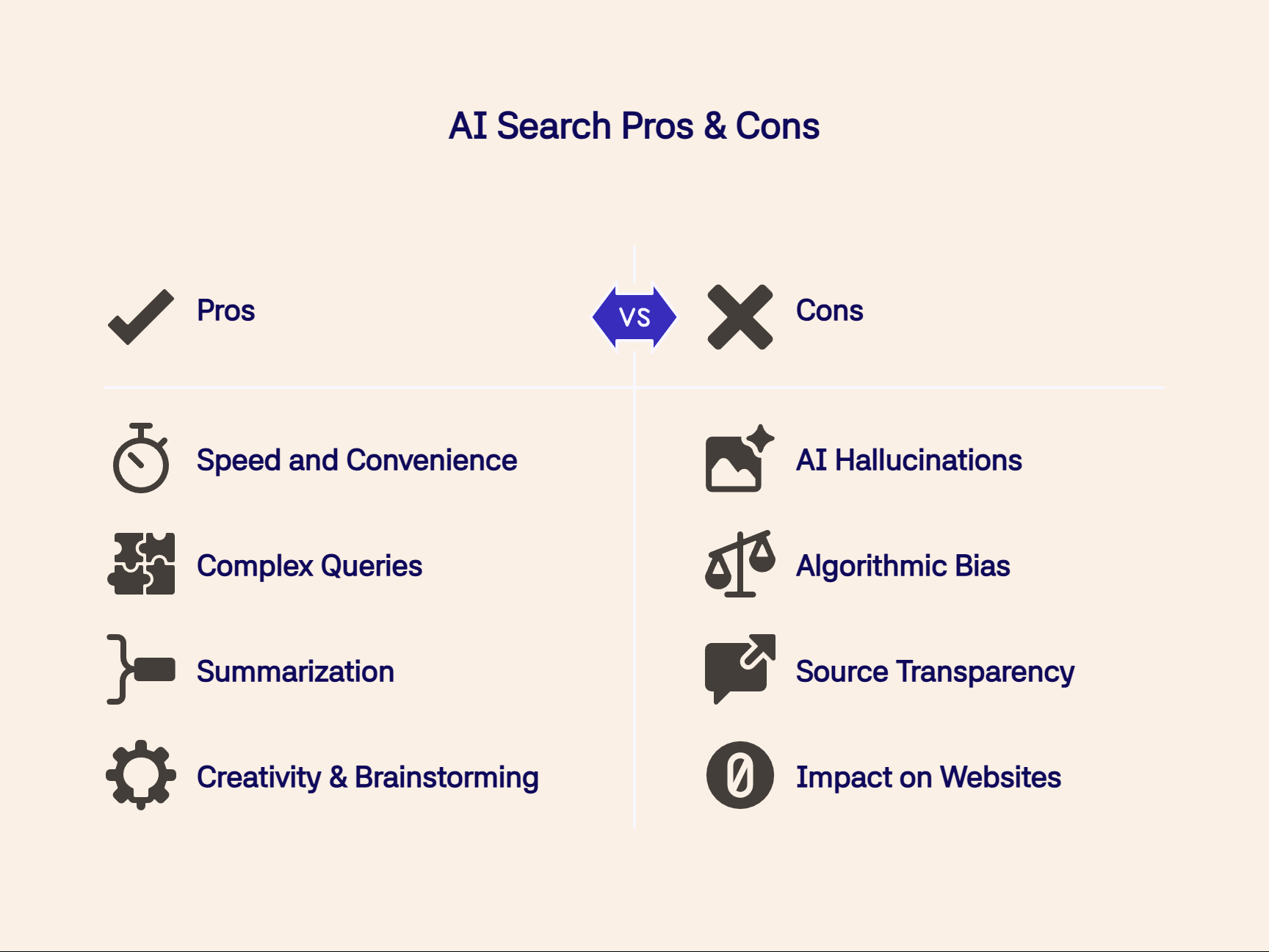
Benefits of AI Search
-
Speed and Convenience: The most immediate advantage is how much time you save. Getting a direct summary for a quick question is much more efficient than opening ten different tabs and hunting for the answer yourself.
-
Complex Queries: AI search excels at answering layered questions that don't have a single source. You can ask things like, "What are the pros and cons of a four-day work week for small tech companies?" and get a nuanced answer pulled from business, HR, and economic sources.
-
Summarization: It's incredibly useful for getting the main points from long or dense content. If you need the gist of a complex scientific paper or a lengthy news report, the AI can deliver the key takeaways in seconds.
-
Creativity & Brainstorming: It can be a fantastic creative partner. You can use it to generate ideas for a project, create a detailed travel itinerary, or even help you draft a tricky email.
Drawbacks of AI Search
-
AI Hallucinations: This is a major issue. Sometimes, an AI will state incorrect information with absolute confidence. Because its goal is to provide a plausible-sounding answer, it can "hallucinate" or simply make up facts, dates, or sources.
-
Algorithmic Bias: The AI learns from the vast amount of text on the internet, which, unfortunately, includes a lot of human bias. These biases can be reflected or even amplified in the AI's answers.
-
Source Transparency: While some AI search engines provide citations, it can be difficult to see exactly where each piece of information in a summary came from. This makes it hard to verify the facts or explore the original context.
-
Impact on Websites: This is a huge concern for content creators and businesses. If users get their answers without clicking any links, the websites that produce the original content lose traffic.
This shift makes it more important than ever for businesses to build a professional website that acts as a direct, authoritative destination for their audience.
How to Use Google's AI Search (AI Overviews)
The good news is that you don't need to do anything special to use Google's AI Overviews. The feature is built directly into the search engine and appears automatically when Google thinks it can best answer your question with a summary.
Here is a simple step-by-step guide to see it in action:
-
Open your browser and navigate to the Google homepage.
-
Type a question or search term into the search bar. It works exceptionally well with questions, so you could try asking questions.
-
Look at the top of the results. If Google generates a summary for your query, an AI Overview box will appear right at the top of the page, above the traditional list of blue links.
That's all. Just keep in mind that the feature doesn't appear for every single search, so you won't see it every time you look for something.
How Do I Get Rid of AI Search on My Phone?
Not a fan of the AI-generated answers? Many people prefer the traditional list of links, and that's perfectly fine.
While Google doesn't currently offer a single switch to turn off AI Overviews in the settings permanently, there is a very simple and effective workaround you can use for any search.
The trick is to use the "Web" filter. Here’s how you do it:
-
Perform a search on your phone just like you always do.
-
Once the results page loads, you'll likely see the AI Overview at the top. Look at the row of filters directly below the search bar (where you see options like "Images," "News," and "Videos").
-
Click the "Web" filter.
-
The page will instantly reload, and the AI Overview will disappear. You'll be left with the classic, old-school search results page that is just a list of blue links.
You will have to do this for each search where you want to see only the web results.
The Search Revolution is Here
The search revolution is here. AI search changes how we find information by giving direct answers instead of links. This process is much faster, but we must be careful with the answers it provides.
This new type of search is not going away. For creators and businesses, the best way to thrive is to build your own authoritative home on the web. This ensures you remain a trusted source for people to find.


